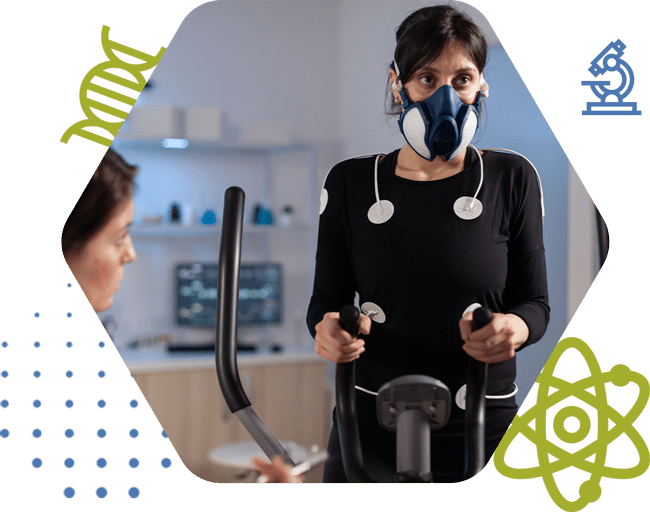Clinical Research at CRN
Understanding Exercise-Induced Asthma
Exercise-induced asthma (EIA), also known as exercise-induced bronchoconstriction (EIB), is a condition where physical exertion leads to the narrowing of the airways, causing difficulty in breathing. This condition is common among athletes and individuals with asthma, but it can also occur in those without a prior history of asthma. EIA is characterized by symptoms such as shortness of breath, wheezing, coughing, and chest tightness, typically occurring during or after exercise.

Key Features of Exercise-Induced Asthma:
Triggering Mechanism: During vigorous exercise, rapid breathing, especially in cold or dry air, can lead to the cooling and drying of the airways. This triggers bronchoconstriction, where the muscles around the airways tighten, causing them to narrow and leading to asthma symptoms.
Symptoms: Symptoms usually begin within a few minutes after starting exercise and may worsen 5 to 10 minutes after stopping. Common symptoms include shortness of breath, wheezing, coughing, chest tightness, and fatigue. Some individuals may also experience decreased endurance and a prolonged recovery time after exercise.
Management: EIA can be managed effectively with a combination of preventive measures and medication. Pre-exercise warm-ups, using a bronchodilator before exercise, and controlling exposure to cold, dry air are common strategies to prevent symptoms. Long-term management may involve inhaled corticosteroids or leukotriene inhibitors.
While EIA is not life-threatening, it can significantly impact an individual’s ability to perform physical activities and participate in sports. Proper management is crucial to enable those affected to lead active, healthy lives.

Clinical Trials in Exercise-Induced Asthma
Clinical trials play a vital role in advancing the treatment and management of exercise-induced asthma. These trials explore a variety of approaches, from new medications and inhaler technologies to preventive strategies and lifestyle interventions. Key areas of research in EIA include:
New Medications: Testing the efficacy and safety of new bronchodilators, corticosteroids, and leukotriene inhibitors specifically designed to prevent or reduce symptoms of EIA during exercise.
Inhaler Technology: Evaluating the effectiveness of new inhaler designs that deliver medication more efficiently during physical activity, ensuring rapid relief and prevention of symptoms.
Preventive Strategies: Investigating non-pharmacological approaches such as warm-up techniques, breathing exercises, and environmental controls to reduce the incidence of EIA.
Patient-Centered Outcomes: Focusing on how new treatments and preventive measures improve the quality of life for individuals with EIA, including their ability to participate in sports and physical activities without limitations.
Genetic and Biomarker Research: Exploring the genetic factors and biomarkers associated with EIA to develop more personalized treatment plans and identify those at higher risk for the condition.
Participation in clinical trials for exercise-induced asthma offers patients access to the latest treatments and contributes to the development of new therapies that can improve the management of this condition.
CRN’s Expertise in Exercise-Induced Asthma Clinical Trials
CRN is a leader in conducting clinical trials for respiratory conditions, including exercise-induced asthma. Our extensive experience and deep understanding of asthma-related disorders make us the ideal partner for successful clinical trials in this field.
Why Choose CRN for Exercise-Induced Asthma Trials?
Specialized Expertise in Respiratory Research: CRN has a proven track record in conducting clinical trials for asthma and related conditions, including exercise-induced asthma. Our investigators are leading experts in respiratory research, bringing years of clinical experience and scientific knowledge to your study.
Comprehensive Patient Recruitment: Recruiting patients for EIA trials requires targeted strategies to help confirm that participants meet specific criteria, such as being active in sports or having a history of exercise-induced symptoms. CRN excels in patient recruitment, utilizing a robust database and targeted outreach strategies to enroll participants who are well-suited for your study.
Advanced Trial Designs: EIA can vary significantly in severity and response to treatment. CRN offers adaptive trial designs that can be tailored to the unique needs of your study, helping generate results that are both meaningful and applicable to a broad patient population.
State-of-the-Art Research Facilities: Our research sites are equipped with advanced diagnostic tools, including spirometry, exercise challenge tests, and methacholine challenge tests, essential for accurately diagnosing EIA and monitoring treatment effects. This supports the collection of reliable, high-quality data.
Regulatory Compliance and Quality Assurance: Conducting trials in exercise-induced asthma requires strict adherence to regulatory standards. CRN provides full regulatory support, helping your study comply with all necessary guidelines from IRB approval to FDA submissions. Our commitment to quality assurance supports the conduct of your trial according to GCP standards, resulting in robust and credible data.
Patient-Centric Approach: EIA can significantly impact patients' ability to engage in physical activities, particularly athletes. CRN adopts a patient-centric approach, providing comprehensive support and education throughout the trial process. This approach contributes to high retention rates and a positive experience for participants.
Proven Success in Asthma Research: CRN has a history of success in conducting asthma trials, including those focused on exercise-induced asthma. Our expertise in this area has made us a trusted partner for pharmaceutical companies, CROs, and other organizations focused on advancing respiratory care.
Partner with CRN for Exercise-Induced Asthma Research
Exercise-induced asthma is a common condition that can limit an individual’s ability to participate in physical activities, but with continued research, we can improve treatment options and enhance the quality of life for those affected. If you are looking to conduct a clinical trial in exercise-induced asthma, CRN is the ideal partner. Our experience, resources, and commitment to excellence support the execution of your trial with precision, integrity, and professionalism.
Contact CRN today to learn more about how we can support your exercise-induced asthma clinical trials and help bring innovative therapies to patients in need.